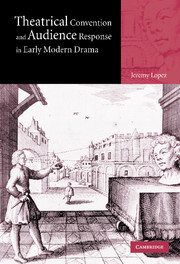Book contents
- Frontmatter
- Contents
- Acknowledgments
- Introduction
- PART I
- PART II
- Introduction to Part II
- 6 Drama of disappointment: character and narrative in Elizabethan and Jacobean tragedy
- 7 Laughter and narrative in Elizabethan and Jacobean comedy
- 8 Epilogue: Jonson and Shakespeare
- Plays and editions cited
- Works cited
- Index
7 - Laughter and narrative in Elizabethan and Jacobean comedy
Published online by Cambridge University Press: 22 September 2009
- Frontmatter
- Contents
- Acknowledgments
- Introduction
- PART I
- PART II
- Introduction to Part II
- 6 Drama of disappointment: character and narrative in Elizabethan and Jacobean tragedy
- 7 Laughter and narrative in Elizabethan and Jacobean comedy
- 8 Epilogue: Jonson and Shakespeare
- Plays and editions cited
- Works cited
- Index
Summary
Characters in Elizabethan and Jacobean comedy are almost always what we expect them to be. While the events of Elizabethan and Jacobean comedy, the outcome of its scenes and plots, are frequently unpredictable, the behavior of comic characters usually is not. Nominally unproblematic resolution is inevitable to the point that narrative is virtually free of the demands of probability. No event is so consequential that its consequences cannot be undone; no loose end cannot be tied up. Acting as a kind of foundation for this narrative freedom is the overt and widespread reliance on stock, conventional, typical characters; the predictability of their behavior provides an order and a system of rules that act as a kind of balance to the disorderly, even lawless manner in which comic narratives develop. Whereas tragedy assimilates the problem of failure into its narrative structures, comedy pushes it away: to fail in Elizabethan and Jacobean comedy is to not get the joke, to be ostracized, to be outside a world where anything is possible and where consequences are inconsequential. The tension that gives Elizabethan and Jacobean comedy much of its vital energy is the tension that exists in the potential for the audience to reject the implausible means by which comedy must move toward its resolution – and thus to be rejected from the world of comedy itself.
- Type
- Chapter
- Information
- Publisher: Cambridge University PressPrint publication year: 2002



